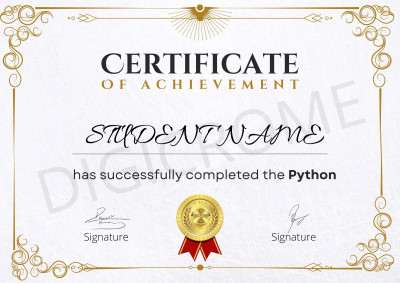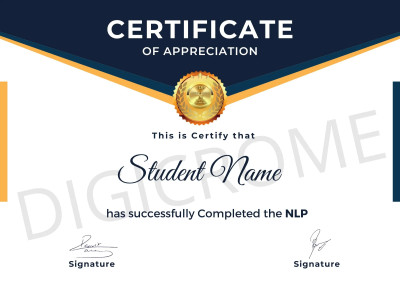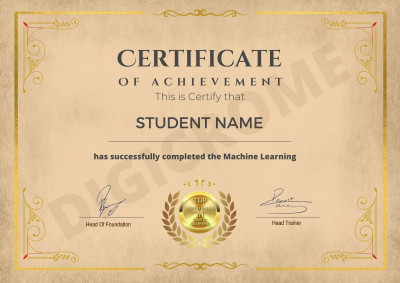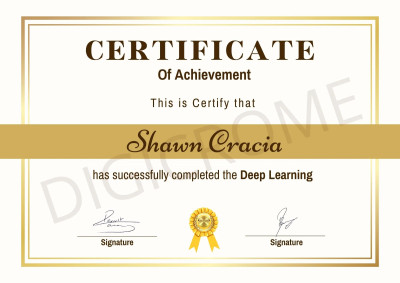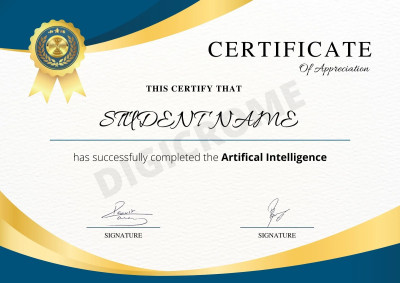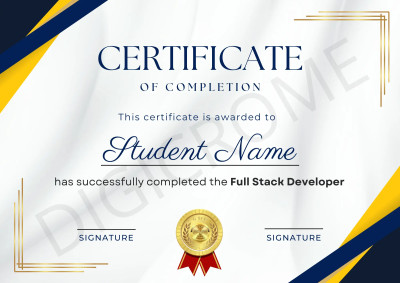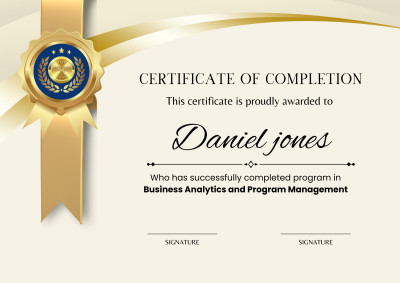Program Overview
Unlocking the Potential of Artificial Intelligence and Machine Learning with Digicrome's Advanced Certification Program
Artificial Intelligence (AI) and Machine Learning (ML) have revolutionized industries, driving innovation and efficiency like never before. Digicrome's Advanced Certification Program in Artificial Intelligence and Machine Learning offers a profound exploration into these cutting-edge technologies, providing participants with the skills and knowledge needed to excel in this rapidly evolving field.
AI Training Excellence:
The program equips programmers to endow machines with the ability to comprehend relationships, make informed decisions, and autonomously interpret environments. This skill set extends to error detection and performance iteration—a critical aspect of effective machine learning.
Machine Learning Focus:
As a pivotal subset of AI, machine learning enables machines to autonomously learn from extensive datasets. Digicrome's comprehensive course spans data preprocessing, time series modelling, and text mining. Tailored for beginners and professionals, the curriculum establishes a robust foundation in core AI concepts.
Why Choose Digicrome for AI Training?
Opting for Digicrome ensures access to world-class instructors and an extensive array of study materials, including videos, quizzes, and capstone projects. With round-the-clock support, Digicrome stands as a beacon for individuals seeking a professional education in AI and machine learning.
Curriculum Highlights:
Foundations of Artificial Intelligence: Explore the fundamentals of AI, including neural networks, deep learning, natural language processing, and computer vision.
Machine Learning Algorithms: Dive deep into supervised and unsupervised learning techniques, reinforcement learning, ensemble methods, and neural network architectures.
Data Science Essentials: Learn data preprocessing, feature engineering, model evaluation, and optimization techniques for effective data analysis and prediction.
Advanced Topics in AI: Delve into advanced AI topics such as generative adversarial networks (GANs), recurrent neural networks (RNNs), convolutional neural networks (CNNs), and transfer learning.
AI Applications and Case Studies: Gain practical experience by working on real-world AI projects and case studies across various domains, including healthcare, finance, marketing, and autonomous systems.
Key Features:
Hands-On Projects: Apply theoretical concepts to real-world projects, enhancing your practical skills and problem-solving abilities.
Expert-Led Instruction: Learn from industry-leading experts with extensive experience in AI and machine learning, gaining valuable insights and best practices.
Flexible Learning: Choose from flexible learning options, including self-paced online courses and instructor-led virtual classrooms, to accommodate your schedule and learning preferences.
Certification: Earn a prestigious certification upon successful completion of the program, validating your expertise and enhancing your career prospects in AI and machine learning.
Networking Opportunities: Connect with fellow professionals, industry experts, and potential employers through networking events, forums, and alumni networks.
Who Should Enroll:
The program is ideal for:
- Data scientists
- Software engineers
- Data analysts
- AI and machine learning enthusiasts
- Professionals looking to transition into AI and machine learning roles
Prerequisites:
- Basic programming skills in languages such as Python
- Familiarity with statistics, linear algebra, and calculus concepts
- Prior knowledge of machine learning fundamentals is recommended but not required
Duration:
The program can be completed in 7 Months, depending on the chosen learning path and individual pace.
Invest in Your Future:
Join the Advanced Certification Program in Artificial Intelligence and Machine Learning and unlock exciting opportunities in one of the most dynamic and high-demand fields of technology. Take the next step towards becoming a proficient AI and machine learning practitioner and stay ahead in today's competitive job market.
Advanced Certification Program In Artificial Intelligence Machine Learning
- ₹149999.00
Features
- Latest Tool & Technology covered
- Topic Wise Case Study Provide
- Guaranteed Job Placement Aid*
- Soft Skills & Job Interviews Preparation
Key Highlights
 Latest Tool & Technology covered
Latest Tool & Technology covered Topic Wise Case Study Provide
Topic Wise Case Study Provide Guaranteed Job Placement Aid*
Guaranteed Job Placement Aid*
 Soft Skills & Job Interviews Preparation
Soft Skills & Job Interviews Preparation
 Expert Experienced Trainers
Expert Experienced Trainers
 Weekly Doubt Session
Weekly Doubt Session
 Lifetime LMS Support
Lifetime LMS Support
 24*7 Career Support
24*7 Career Support
Program Objective
1.1 What is ML
1.2 Why ML
1.3 Types of ML
1.4 Main Challenges - Overfitting, Underfitting, Poor Quality data, Irrelevant Features etc
1.5 What are Hyperparameters
1.6 How to Select ML model
2.1 Accuracy
2.2 Recall
2.3 Precision
2.4 F1 Score
2.5 Confusion Matrix
2.6 Classification Report
2.7 Precision/Recall Tradeoff
2.8 ROC Curve
2.9 AOC Curve
2.10 Binary and Multilabel Classification
2.11 Feature Engineering and Feature Importance/Selection
3.1 Gradient Descent and Stochastic Gradient Descent
3.2 Logistic Regression
3.3 K Nearest Neighbors
3.4 Naive Bayes
3.5 Support Vector Machines
3.6 Linear Discriminant Analysis
3.7 Decision Trees
3.8 Hyperparameter Tuning - GridSearchCV and RandomizedSearchCV
4.1 Bagging - Eg: Voting Classifiers
4.2 Boosting - XG Boost, Adaboost, etc
4.3 Cross-Validation
4.4 Random Forest Classifier
4.5 XG Boost Classifier
4.6 Stacking
4.7 Hyperparameter Tuning
5.1 Simple Linear Regression
5.2 Multiple Linear Regression
5.3 Polynomial Regression
5.4 Cost Function and Gradient Descent
5.5 Performance Metrics - MSE, RMSE, MAE etc
5.6 Heteroskedasticity, Non Normality and Correlated Errors
5.7 Hyperparameter Tuning
6.1 Decision Tree Regressor
6.2 Support Vector Machines
6.3 K Nearest Neighbors
6.4 Random Forest
6.5 Boosting
6.6 Hyperparameter Tuning
7.1 Introduction to Unsupervised Learning
7.2 K Means Clustering
7.3 Hierarchical Clustering
7.4 Model-Based Clustering
7.5 DBSCAN
7.6 Anamoly Detection using Gaussian Mixtures
- Dimensionality Reduction - Principal Component Analysis ( 1 Class on this topic )
- Recommendation Systems ( 2 Class on this topic )
10.1 Biological to Artificial Neurons
10.2 The perception
10.3 Multi-layer Perceptrons (MLPs)
10.4 Input Layer, Hidden Layers and Output Layers
10.5 Weights and Biases
10.6 Regression MLPs
10.7 Classification MLPs
10.8 Activation Functions and Optimizers
11.1 Building a Neural Network using Sequential API
11.2 Building a Neural Network using Functional API
11.3 Building a Neural Network using Subclassing API
11.4 Saving and Restoring a Model
11.5 Callbacks
- Vanishing/Exploding Gradients
- Batch Normalization
- Gradient Clipping
- Transfer Learning - Using Pretrained Layers
- Pretraining on Auxiliary Task
- Faster Optimizers - RMSprop, AdaGrad, Adam, Nadam, Nesterov Accelerated Gradient
- Learning Rate Scheduling
- How to choose number of hidden layers and number of Neurons
- Learning Rate, Optimizer, Batch size and Activation Functions
- L1 and L2 Regularization
- Dropouts and Batch Normalization
- Max Norm Regularization
- The Architecture of Visual Cortex
- Convolutional Layers
- Feature Maps
- Pooling
- Padding
- Stacking Multiple Feature Maps
Hands-on Experience - Building an Image Classifier using CNN ( Total 2 Class on this Topic)
Object Detection, Image Segmentation, and Semantic Segmentation ( Total 2 class on this topic)
- Learning Predefined Architectures - LeNet, AlexNet, GoogleLeNet, ResNet, VGGNet, Xception, SENet
- Transfer Learning - Using Pretrained Models from Keras
- Classification and Localization
- Introduction to Recurrent Neurons and Layers
- Memory Cells
- Implementation and Training of Recurrent Neural Networks
- Time Series using Recurrent Neural Networks
- Deep RNNs for Time Series
- Forecasting Several Time Steps Ahead
- Handling Long Sequences using LSTM and GRU cells
- Introduction to Autoencoders
- Encoder-Decoder Networks
- Stacked Autoencoders
- Reconstructing Fashion MNIST Data using Autoencoders
- Types of Autoencoders - Convolution, Recurrent, Denoising, Sparse and Variational Autoencoders
- Anamoly Detection using Autoencoders
- What are GANs? Why GANs?
- Generator and Discriminator
- Building a Deep Convolutional GAN on Fashion MNIST Data
- What is Reinforcement Learning?
- Learning to Optimize Rewards
- Policy Search
- Hands-on Experience using Open AI Gym
- The Credit Assignment Problem
- Q Learning and Deep Q Learning
- Implementing Deep Q Learning using keras
- Overview of NLP and its Applications
- Data Preprocessing for NLP
- Key Components - Tokenization, Stemming and Lemmatization
- Hands-on Experience - Generating AI Text
- Sentiment Analysis in NLP using Keras
- Bidirectional Recurrent Neural Networks
- Beam Search
- Sequence to Sequence Model
- Building a Basic Encoder-Decoder Network for NMT
- Introduction to Attention Mechanisms
- Visual Attention
- The Transformer Architecture
- Fine Tuning NLP Models for NLP Tasks
Hands-on Experience - Building a Basic Chatbot (2 Class on this topic)
Our Certificates
Certified by









